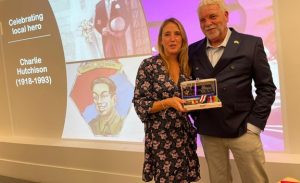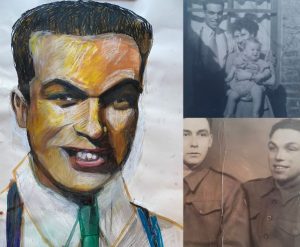Museum of Oxford funds upcoming biography for local Black-British hero Charlie Hutchison (1918-1993)
 8 min read
8 min read
Charlie Hutchison’s son John and granddaughter Michelle, at an event hosted by the Museum of Oxford celebrating Charlie Hutchison’s life, 28 October 2022.
The Peter McQuitty Bursary, a research bursary awarded by the Museum of Oxford to fund local heritage projects led by young people in Oxford, has chosen to award local historian Dan Poole with funding for the research and creation of a biography of Charlie Hutchison. Due for completion in early 2024, this biography will contain original research based on newly recorded oral interviews with Charlie’s surviving family, alongside newly uncovered archival documents and photographs.
In this article, Dan Poole answers some questions about the Peter McQuitty Bursary and the direction of his research.
Who was Charlie Hutchison?
Charles William Duncan Hutchison (1918-1993), born on the outskirts of Oxford in the small historic village of Eynsham, grew up to become a life-long anti-fascist and trade unionist. He is most notable for being the only known Black-British person to fight in the Spanish Civil War. Having probably lied about his age when travelling to Spain, he was among the youngest foreign volunteers, one of the longest-serving, and one of the first to arrive from Britain. After narrowly surviving a bloody defeat which wiped out many of his fellow volunteers, he switched from fighter to ambulance driver, saving countless lives during the war. Come the start of the Second World War, Charlie joined the British military and was present at the Dunkirk Evacuation, the Italian Campaign, the North Africa Campaign, the Anglo-Soviet invasion of Iran, and the liberation of Belsen concentration camp. Having barely survived his ten-year crusade against fascism and having witnessed the very worst of humanity, Charlie laid down his weapons to begin a new life. He raised a large family and lived a long and quiet life in South England, only occasionally returning to politics in support of peace campaigns and trade unions.
Born into poverty and having spent years of his childhood in an orphanage, Charlie’s early experiences of racism and poverty inspired his life-long support for trade unions and anti-fascism. When asked why he had risked everything to fight fascists, Charlie summarised his life into two sentences:
“I am half black, I grew up in the National Children’s Home and Orphanage. Fascism meant hunger and war.”
Despite his incredible achievements, Charlie’s existence was largely absent from history books and his existence unknown to modern historians. Charlie had been forgotten by almost everyone except his immediate family. It was not until 2019 when a project led by school children in London would lead to his rediscovery.

Left) Portrait of Charlie Hutchison by Oxford based artist Dorothy Megaw. (Reproduced Courtesy of Dorothy Megaw) Top-right) Photograph of Charlie with his wife and first child. Bottom-right) Charlie photographed with an unknown man during WWII. (Photos reproduced courtesy of Charlie Hutchinson’s family)
Can you provide some samples of the research so far?
The biography of Charlie Hutchison has been in production since July 2023 and the final draft is scheduled for completion in early 2024. Of some of the examples of discoveries made since the beginning of this research:
Charlie had welcomed miners into his family’s home during the UK miner’s strike of 1984-1985. Charlie’s wife Patricia had been in contact with communist activists from the United States, and was active in the Campaign for Nuclear Disarmament. Charlie sent all his children to socialist themed Sunday schools where they taught the children about theatre and music. Charlie played a leading role in the creation of the International Brigade monument in London’s Jubilee Gardens. Charlie and his family had very close personal connections with Bill Alexander, the former commander of the British Battalion of the International Brigades, anti-fascist fighters who fought in the Spanish Civil War.How does this biography contribute to Oxford’s history and culture?
Put simply, there has yet to be a comprehensive biography of Charlie Hutchison and by creating one the Peter McQuitty Bursary will be funding new and original research about one of Oxford’s most famous residents.
Despite Charlie’s notability and new-found fame following his recent rediscovery, the available information about Charlie Hutchison is still lacking. Most of the available information about Charlie is relegated to online articles in obscure publications, which have quickly become outdated following the steady stream of newly uncovered information. This biography will cut through the confusion to create a one-stop place for all the available evidence about the life and achievements of a famous man from Oxfordshire.
In the past decade publications such as Pamela Robert’s Black Oxford (2013), new research into figures such as Christian Cole (1852-1885) and Kofoworola Ademola (1913-2002), and the slavery commemorations of All Souls College among others, have all brought the history of black people in Oxford to the forefront of public knowledge. However, it is exceedingly rare that a Black person born in Oxfordshire before the Windrush generation would go on to gain such notability for their achievements, putting Charlie in the unique position of being not only a famous black person with links to Oxford, but a native Oxfordian born and molded by their early experiences in the county.
Charlie Hutchison’s son John and granddaughter Michelle, at an event hosted by the Museum of Oxford celebrating Charlie Hutchison’s life, 28 October 2022.
How has the Peter McQuitty Bursary supported this research?
The Peter McQuitty Bursary is a research fund that awards between £500 and £1,000 to a young person for the creation of a project which will “share, interpret and preserve the histories and cultures of the people of Oxford.” The money is intended to be used for costs including travel, workshops, presentations, and other materials which will help the creation of the chosen project. In this instance, the bursary has awarded funds to support the travel, research, and production costs of this research.
What will the money be spent on?
The following are examples of some of the expenses the Peter McQuitty bursary has chosen to cover for the creation of the Charlie Hutchison biography:
Travel expenses to visit Charlie Hutchison’s surviving family and conduct in-depth oral interviews with his surviving children to uncover new evidence. Travel expenses and photography licenses to conduct a deep-dive into records on Charlie Hutchison held by the Marx Memorial Library and the British Library. Travel expenses within Oxford for frequent trips to the Bodleian Library. Production costs for a cover design and promotional materials. Copies of the completed book to be sent to reference libraries and relevant archives.How exactly will this biography be created?
The following steps detail how the biography is going to be created.
Firstly, a skeleton structure is created for the biography. A list of chapter titles is created which will encompass all the known aspects of Charlie Hutchison’s life. A list of all the published material is created and their information added to the first draft of the biography, taking note of any contradictions. New and original information is gathered through extensive oral interviews with Charlie’s surviving children Susan and John. This information is then added to the biography. During this same meeting, Charlie’s relatives will provide copies of any unpublished photographs and documents they wish to share. A visit to the Marx Memorial Library in London is made to examine all the available documents kept by their archives. Now approaching a final draft, experts in the field and authors of articles on Charlie Hutchison are emailed to inquire about any new information they hold which may have been missed by this research. Finally, the copy-editing and production stage begins, where the final draft is produced and the author searches for a publisher.The current draft title for this biography is set to be Charlie Hutchison: The Life and Struggles of a Black-British anti-fascist, and is on track to being completed in early 2024. Special thanks is due to Charlie Hutchison’s daughter Susan and his son John for their permission to reproduce countless photographs and documents to aid this research, and to museum staff Katy Hammond for supervising this project.
Want to write your own Oxford-inspired post? Sign up as a volunteer blogger.
Copyright
© Oxford University
